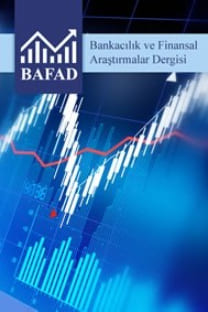YÜKSELEN PİYASA EKONOMİLERİNDE ŞÜPHELİ BANKA KREDİLERİ VE KREDİ AÇIĞININ DÖNGÜSEL ETKİLEŞİMLERİ
Çalışmada yükselen
piyasa ekonomilerinde şüpheli banka kredileri ve kredi açığının ekonomik ve
finansal döngülerden nasıl etkilendiği araştırılmıştır. Bu çerçevede şüpheli
krediler ile kredi açığının ekonomik faaliyet hacmini yansıtan değişkenlerle
karşılıklı etkileşimleri üzerinde durulmuştur. 20 yükselen ekonomiden derlenen
1999-2014 dönemi yıllık verilerinden meydana gelen bir panel veri seti analiz
edilmiştir. Analiz yöntemi olarak Cagala ve Glogowsky’nin (2012)
geliştirdikleri panel VAR yöntemi kullanılmıştır. Elde edilen bulgular, banka
kredilerinin ekonomik faaliyet hacmi ve finansal varlık fiyatları üzerindeki
derin etkileri olduğu görüşünü doğrular niteliktedir. Öte yandan bu etkileşim
tek yönlü değil, karşılıklıdır. Şüpheli kredilerin olası finansal ve reel
şoklardan şiddetli bir şekilde olumsuz etkilendiği saptanmıştır. Benzer şekilde
bu değişkende gözlenebilecek şokların hem reel hem de finansal ekonomide ciddi
dalgalanmalara neden olması olasılığı belirlenmiştir. Sistemik banka
krizlerinin öncü bir göstergesi olarak gösterilen kredi açığı da reel ve
finansal şoklara duyarlıdır.
Anahtar Kelimeler:
Kredi riski, kredi açığı, döngüsellik, panel VAR modelleri
CYCLICAL INTERACTS OF CREDIT RISK AND CREDIT-TO-GDP GAP IN EMERGING MARKET ECONOMIES
In the study, how the
non-performing bank loans and the credit-to-GDP gap affected the economic and
financial cycles in the emerging market economies were investigated. Especially
the interactions of the non-performing loans and the credit-to-GDP gap with the
variables reflecting the economic activity volume is emphasized. A panel data
set compiled from 20 emerging market economies and consisting of annual data
covering the period 1999-2014 has been analyzed. The panel VAR method developed
by Cagala and Glogowsky (2012) is used as the analysis method. Findings confirm
that bank loans have profound effects on economic activity volume and financial
asset prices. On the other hand, it is also determined that this interaction is
reciprocal. According to the findings, non-performing loans are severely
affected by possible financial and real shocks. Likewise, the likelihood that
credit shocks will cause serious fluctuations in both the real and financial
economy has been determined. The credit-to-GDP gap, which is seen as a leading
indicator of systemic bank crises, is also sensitive to real and financial
shocks.
Keywords:
Credit risk, credit-to-GDP gap, cyclicality, panel VAR models,
___
Ali, A. and Daly, K. 2010. Macroeconomic Determinants of Credit Risk: Recent Evidence from a Cross Country Study, International Review of Financial Analysis, 19, 165-171.Arellano, M. ve Bover, O. 1995. Another Look at the Instrumental Variable Estimation of Error-components Models, Journal of Econometrics, 68, 29-51.
Canova, F., Ciccarelli, M. 2014. Panel Vector Autoregressive Models: A survey, Advances in Econometrics, 32, 205-246.
Cagala, T. ve Glogowsky, U. 2012. Panel Vector Autoregressions for Stata (xtvar), October.
Cagala, T., Glogowsky, U., Grimm, V. ve Rincke, J. 2015. Cooperation and Trustworthiness in Repeated Interaction, EconStor, E03-V3.
Castro, V. 2013. Macroeconomic Determinants of the Credit Risk in the Banking System: The Case of the GIPSI, Economic Modeling, 672-683.
Chaibi, H. and Ftiti, Z. 2015. Credit Risk Determinants: Evidence from A Cross-country Study, Research in International Business and Finance, 33, 1-16.
Gosh, A. 2015. Banking-industry Spesific and Regional Economic Determinants of Non-performing Loans: Evidence from US States, Journal of Financial Stability, 20, 93-104.
Jakubik, P. and Schmieder, C. 2008. Stress Testing Credit Risk: Comparison of the Czech Republic and Germany, BIS Financial Stability Institute Paper, September.
Im, K. S., Pesaran, M. H., and Shin, Y. 2003. Testing for unit roots in heterogeneous panels. Journal of Econometrics, 115(1), 53–74.
Lin, E. S. and Ali, H. E. 2009. Military spending and inequality: Panel Granger casuality test. MRPA Papers, No. 40159, July.
Love, I. and Zicchino, L. 2006. Financial Development and Dynamic Investment Behavior: Evidence from Panel VAR, The Quarterly Review of Economics and Finance, 46, 190-210.
Louzis, D. P., Vouldis, A. T., and Metaxas, V. L. 2012. Macroeconomic and Bank-spesific Determinants of Non-performing Loans in Greece: A Comparative Study of Mortgage, Business and Consumer Loan Portfolios, Journal of Banking and Finance, 36, 1012-1027.
Manab, N. A., Theng, N. Y., and Md-Rus, R. 2015. The Determinants of Credit Risk in Malaysia, Procedia – Social and Behavioral Science, 172, 301-308.Mileris, R. 2012. Macroeconomic Determinants of Loan Portfolio Credit Risk in Banks, Engineering Economics, 23(5), 496-504.
Misman, F. N., Bhatti, I., Lou, W., Samsudin, S., and Abd Rahman, N. H. 2015. Islamic Banks Credit Risk: A Panel Study, Procedia – Economics and Finance, 31, 75-82.
Nkusu, M. 2011. Nonperforming Loans and Macrofinancial Vulnerabilities in Advanced Economies, IMF Working Paper, No. WP/11/161, July.
Pesaran, H. M. 2007. A simple panel unit root test in the presence of cross-section dependence. Journal of Applied Econometrics, 22(2), 265-312.
Tunay, K.B. ve Tunay, N. (2016). Yükselen Ekonomilerde Makro Ekonomik Dengesizliklerin Etkileşimleri: Kırılgan Sekizli Örneği, 17. Uluslararası Ekonometri, Yöneylem Araştırması ve İstatistik Sempozyumu, Cumhuriyet Üniversitesi, Sivas, Aralık, Bildiriler Kitabı, 427-439.
Vogiazas, S. D. and Nikolaidou, E. 2011. Investigating the Determinants of Nonperfoming Loans in the Romanian Banking System: An Empirical Study with Reference to Greek Crisis, Economics Research International, 2011(1), 1-13.
Yurdakul, F. 2014. Macroeconomic Modeling of Credit Risk for Banks, Procedia – Social and Behavioral Science, 109, 784-793.
Zhu, N., Wang, B., and Wu, Y. 2015. Productivity, Efficiency, and Non-performing Loans in the Chinese Banking Industry, The Social Science Journal, 52, 468-480.
- ISSN: 2148-4090
- Yayın Aralığı: Yılda 2 Sayı
- Başlangıç: 2014
- Yayıncı: Ankara Hacı Bayram Veli Üniversitesi
Sayıdaki Diğer Makaleler
YÜKSELEN PİYASA EKONOMİLERİNDE ŞÜPHELİ BANKA KREDİLERİ VE KREDİ AÇIĞININ DÖNGÜSEL ETKİLEŞİMLERİ
Kaşif Batu Tunay, Necla Tunay, Akhisar İlyas
KÜRESELLEŞME GÜCÜNE KARŞILIK AİLE İŞLETMELERİNDE PROFESYONEL YÖNETİM
DÖVİZ KURU HAREKETLERİNİN TÜRKİYE’NİN DIŞ BORÇ STOKU ÜZERİNDEKİ ETKİSİNİN ANALİZİ
